The House Education Committee passed a bill Monday that expands and extends a current law allowing parents unpaid time off from work for certain school activities.
But the 6-5 vote was party line, with Democrats in the majority, and the two hours of debate revived old arguments that flared six years ago when the original time-off law was passed.
“When the parents are involved in their kids’ education, the kids are more likely to succeed,” argued prime sponsor Rep. Rhonda Fields, D-Aurora. She repeatedly characterized House Bell 15-1221 as all about getting parents more involved in their children’s education.
Republican committee members questioned the bill, primarily because there’s no data about whether the 2009 law has had any impact or whether parents are being denied time off for school events.
“We all value parent engagement,” said Rep. Paul Lundeen, R-Monument. “But the data is exceptionally thin.”
Fields and co-sponsor Rep. John Buckner, D-Aurora, acknowledged that problem but defended the bill.
“I don’t know if we’re ever going to get answers to how many people are being denied” time off, Fields said.
Buckner, recalling his 40 years as an educator, said, “I know there were parents who couldn’t get to school because of their work schedules.”
The bill was supported by witnesses representing 9to5 Colorado, Padres y Jovenes Unidos, STRIVE Prep, Clayton Early Learning, and the American Federation of Teachers and Colorado Education Association.
But lobbyist Loren Furman opposed the bill on behalf of the Colorado Association of Commerce and Industry and the National Federation of Independent Business.
“There is no data showing employers are denying leave,” she said. “More than 90 percent of employers have some sort of alternative leave arrangement.”
The 2009 law
A measure named House Bill 09-1057 required businesses with 50 or more employees to give employees up to 18 hours a year in unpaid leave for parent-teacher conferences or meetings related to special education services, interventions, dropout prevention, attendance, truancy, or disciplinary issues.
The requirement didn’t apply to businesses with existing leave policies, and the law contains no enforcement provisions or penalties for non-compliance.
Most important, the law was scheduled to expire in 2015, creating the need for a bill this session.
The issue was controversial in 2009, and the original version of the bill was diluted substantially. “In 2009 it took quite a bit of energy to come to the compromise,” lobbyist Furman recalled. (See this story from the Chalkbeat Colorado archives for more background.)
The 2015 bill
HB 15-1221 proposes to extend the law indefinitely and also add meetings with school counselors and “academic achievement ceremonies” to the list of school events for which parents can claim time off.
Fields and Buckner said they wanted to add “positive” school events to the original list. But the committee passed an amendment to eliminate a catch-all phrase that would have allowed time off for “other activities in which the child is directly participating and that contribute to the child’s academic progress.”
The bill also would extend the law to parents of preschool students and require school districts to inform parents about the time-off law.
What’s next
Wilson proposed an unsuccessful amendment to put a five-year sunset clause in the bill, HB 15-1221, and he also was unsuccessful in having the bill sent to the House Business Affairs and Labor Committee.
So the 6-5 vote sent the bill to preliminary consideration on the House floor, where Monday’s debate is likely to be repeated.
If the bill passes the House, it likely faces a tougher time in the Republican-controlled Senate. Democrats controlled both houses of the legislature in 2009 when the original time-off law was passed.
Read text of bill here.


